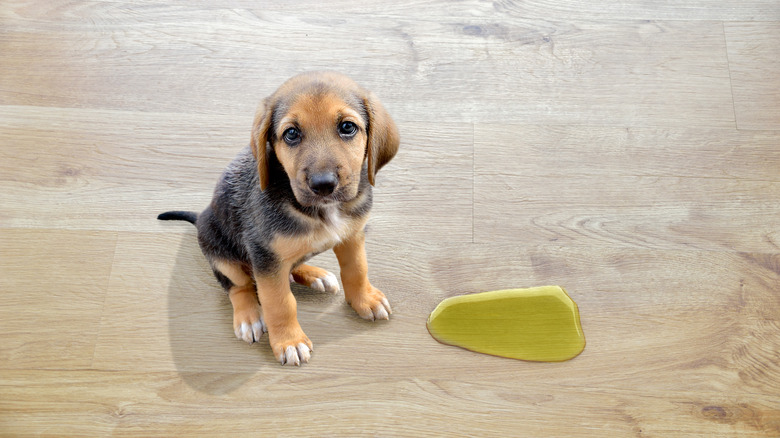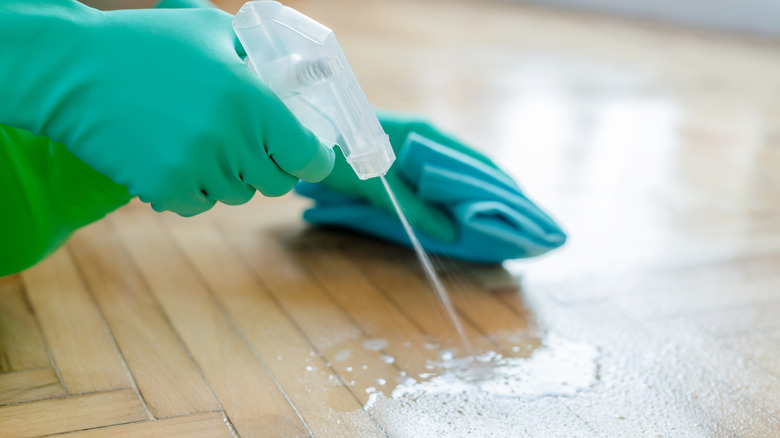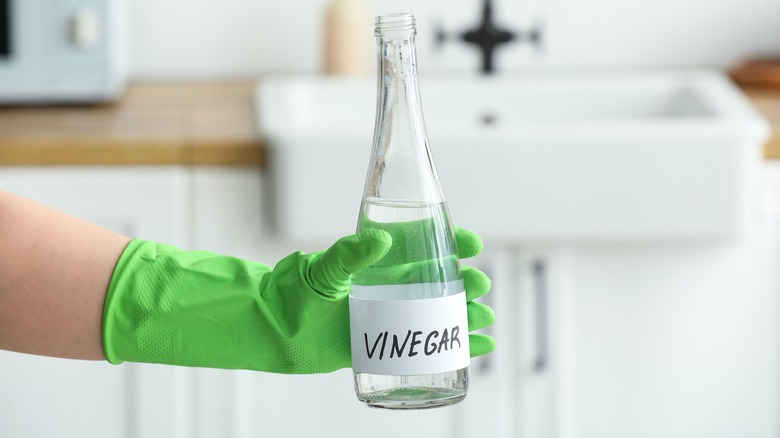The Best Way To Prevent Pet Messes From Ruining Your Hardwood Floors
Hardwood is a classic flooring choice that pairs best with modern farmhouse, rustic, and other contemporary decor styles. Since they cost you dearly, you obviously want them to last so you can get a decent return on your investment. However, your well-laid plans will go astray if your pet continuously urinates on the floor. In mild scenarios, the wood might merely discolor after a short while. But, you could have to deal with warping and structural damage to your flooring if the mess has time to set in. This is why Brett Miller, Vice President of Technical Education & Certification at National Wood Flooring Association, advised that you should "wipe up pet accidents as quickly as possible with a lightly dampened cloth, then use a cleaning product for use on wood floors specifically" in his exclusive interview with House Digest.
Cat parents should especially heed Miller's advice and soak up the mess promptly. "Cat urine is normally more damaging than dog urine," Miler explained. "Cat urine generally has a higher concentration [of] uric acid and ammonia, which can penetrate deeper into the wood and can cause more permanent and severe discoloration on wood floors." On the other hand, "Dog urine can also cause damage if its not cleaned up in a timely fashion but is generally less likely to cause the same damage." That being said, if you'd rather not take any chances, he suggested, "The faster pet urine is cleaned up, the better the outcome."
How to rid your hardwood floors of urine stains
Although you want to instantly soak up your pet's messes off your hardwood floors, it might not always be possible. This doesn't just lead to your home smelling foul; you'll also have to deal with stubborn stains thanks to the insoluble salt crystals present in the liquid. They adhere to your flooring with all their might, and it can be a pain to get them out. Under such circumstances, "use a cleaner that has been recommended to you by a wood flooring professional and may be slightly stronger than what you use as part of your regular cleaning routine," said Brett Miller in his exclusive interview with House Digest.
To bring your hardwood floors back to life, Miller said to "apply [the cleaner] directly to the stain and repeat as necessary." Follow the manufacturer's instructions closely for best results. However, in case the stain has set in completely, even a dedicated cleaner might not be of much help. In those situations, Miller recommended having a NWFA certified wood flooring professional handle the job. "For stubborn stains, contact a wood flooring professional who may be able to use a tannin remover to get rid of the stain or repair the impacted area if necessary," he said.
Avoid polishing products and hacks
While looking at products to get stains out of your hardwood floors, you might be tempted to buy one that also polishes your dull flooring. Yet, giving in to the temptation could spell trouble for such surfaces. Brett Miller explained in his House Digest exclusive, "Avoid using products from the store that claim to restore luster, polish, or add shine. These types of 'maintenance products' leave behind a temporary, non-protective, shiny film that will interfere with future maintenance coats of professional wood floor finish." So, unless you want to damage your floors further, leave the miracle worker behind in the store and get a dedicated cleaner instead.
Miller also advised against using cleaning hacks for urine stains on hardwood floors. "Don't use household items such as bleach, salt, vinegar, or others that you may read about trying on the internet. Also, never use a steam mop as it can permanently damage the wood and the floor's finish." Even if these items boast about their cleaning efficacy and how well they disinfect, Miller doesn't recommend experimenting with them on your hardwood floors.


